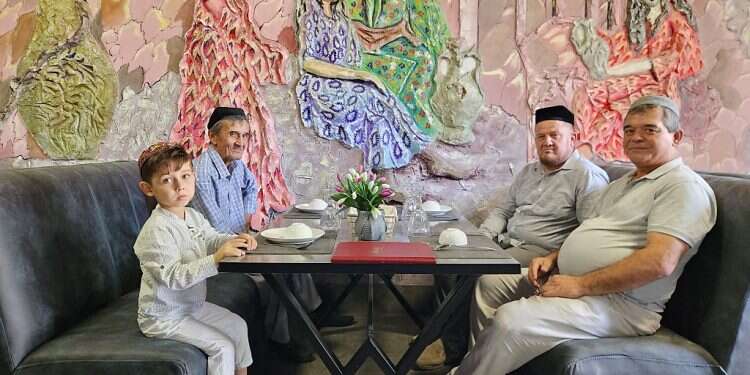The first thing you notice as you land in Uzbekistan is how friendly people are; and how everything is clean. No one smokes publicly, and everyone speaks in the softest voice, even if there is something that is not right or disagreement.
In fact, if there is one thing that will never cease to amaze you while visiting this Central Asian country it is just how welcoming the
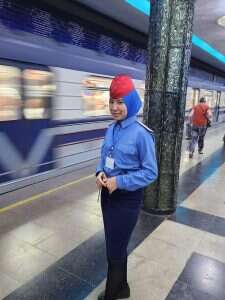
population is; how easy it is to talk to people and have them pose for the camera; how easily they would share their Instagram account with you and agree to speak to an Israeli journalist.
Follow Israel Hayom on Facebook, Twitter, and Instagram
This country of some 40 million is predominantly Muslim, but it is defined as a secular country. People are not obliged to follow Islamic tradition publicly – in fact, you can eat at a restaurant during the Holy Month of Ramadan and no one will be shocked. And unlike what you will see in many other Muslim countries, the mosques are almost nowhere to be seen (except the historical mosques that are indeed impressive and grand).
Calls to prayer are seldom heard, and the Islamic traditions – while very common – are observed at one's own discretion. In fact, the constitution prohibits the country from becoming Islamic. Considering that it lies in the heart of one of the most geopolitically strategic places in the Muslim world – bordering Afghanistan and only a short distance from Iran and Pakistan – it seems that Uzbeks are determined to be a beacon to the world on how modernity, tradition, and patriotism can exist in harmony. I happened to visit there when the country celebrated 32 years of independence from the Soviets. Celebrations in Bukhara were unique for those of us in the West: Early in the morning residents work up for a "marathon" of five kilometers (about 3.1 miles). Then they all gathered in the historic town square to watch the Uzbekistani special forces demonstrate their capabilities, and then there was a live performance of a male singer next to a woman dancer. Uzbeks, it seems, are proud that they have advanced so far ahead since they obtained independence from Moscow, although you do hear quite a lot about how lucky they are that the USSR invested so much during the multi-decade occupation, including the construction of the first Central Asian metro system in Tashkent (which still has themes from that era: A station whose lamps look like cotton; a station memorializing the cosmonauts of the era, with special murals showing their portraits). What's even more interesting is that many younger Uzbeks, according to my guides, want a US Green Card and the authorities see it as part of the natural inflow of people in global immigration, especially young people who want to go abroad to work and study, as well as other sectors. The way they see it is this: If they get residency in the US, they could make a fortune and send remittances to their loved ones back home, including the many family members who may still live in remote and impoverished agrarian communities. Everyone wins. The government is prioritizing modern educational infrastructure and more jobs for young people.
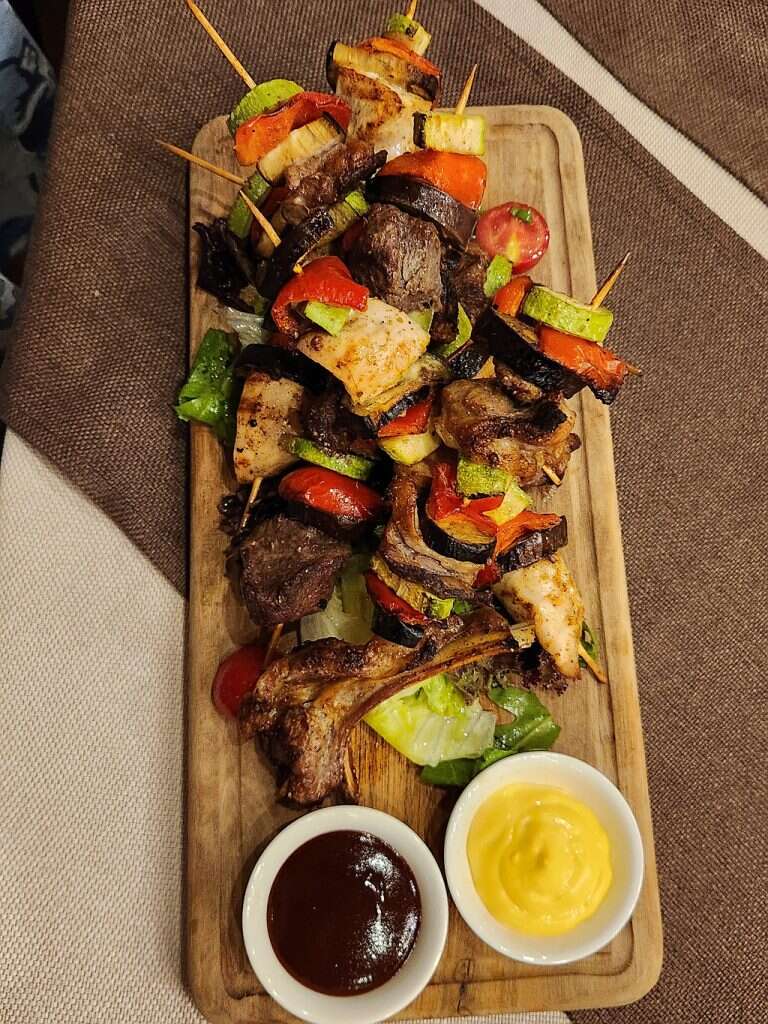
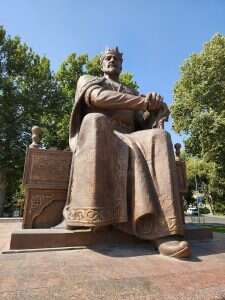
As a country that is still very much a democracy-in-the-making, having gained independence from the Soviets in the 1990s, it is clear that the authorities get their way whenever they want. But it would be wrong to cast it as a state where there is no democracy at all. The government has tried – at least publicly – to carry out wide-scale reforms for building a modern democratic state. In fact, you don't feel threatened by the government or get followed by agents (at least that was my experience as a tourist) – unlike other less friendly countries in the region.
Likewise, people you speak with express their views, and you can even see them arguing with police officers freely when something is not right, although it is unclear how much protest is allowed on a large scale. People will gladly speak about the situation of the country and what the government is doing good and bad. Although the authorities have been known to restrict activities that they deemed to be deviant from the official line, including when it comes to religion, making it hard to form religious groups and associations, in recent years – especially after the new president has assumed power in 2016 – the government has been less strict about the public expression of Islam.
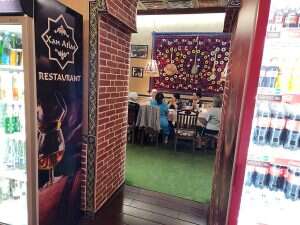
Visiting the country today you can see Islam and tradition of all stripes – young girls with headscarves holding hands with boys in shorts; elderly women dressed in traditional garbs alongside men in suits; Kentucky Fried Chicken with kebab options next to bazaars that sell everything from cashews and flowers to chicken and lamb.
Islam it seems, is an afterthought – making this country a truly unique place, where women and men don't compete for dominance, where every stranger is your friend, and where you can walk around at midnight without feeling even the slightest fear.
Don't miss the pulao
Uzbekistan prides itself on being the home of the pulao (pilaf), a flavorful rice dish that is part of local life and even an identity for all Uzbeks: rich and poor, rural and urban.
Video: Prayers in the Amir Timur Mausoleum
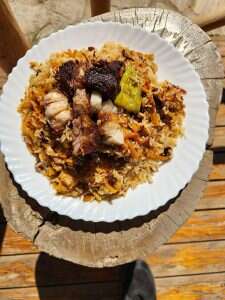
Every region of Uzbekistan owns its pilau recipe. One variety of this dish is Kabuli Pulao. Its aromatic blend of rice, vegetables, and spices, along with lamb meat, is something to die for. You can find it in certain parts of the country, but of course, there are many other variations of the dish.
This dish captures the essence of Uzbek cooking. Dishes in this country, from dumplings and somsa to pulao to kebab, have a theme for them: meat, mostly mutton. To that one can add a whole host of varieties in the form of vegetables and rice, or both, as well as soup that combines all three ingredients. All dishes have such a great aroma, due to the spices and long cooking.
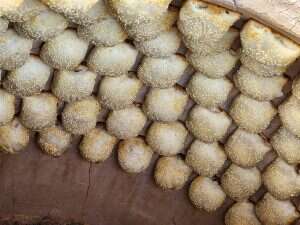
Uzbekistan shares culinary traditions with the Uyghurs, and one notable example is Laghman, a delicious noodle dish. This savory and hearty meal consists of hand-pulled noodles served with vegetables and meat, showcasing the influence of the Silk Road on the region's cuisine. Getting around is cheap, using the Yango app, even with a foreign number. Driving to a place that is 30 minutes away will cost you about a dollar, and while there are not a lot of developed malls, a big opening is set to take place for the Tashkent City Park Mall. It lies in the heart of a modern shopping and hotel area, and it will have many of the famous brands we know of in the West.
Tea time
As noted, Islam is not the official religion. As such, you could easily find beer and other forms of alcohol on public display (in fact, liquor stores are commonly found on main streets open well into the night in Samarkand).
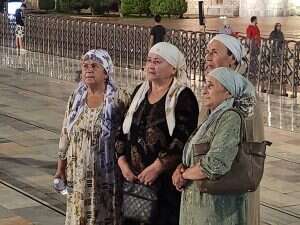
But unlike the espresso-sipping Westerners, Uzbeks prefer green tea, which holds a special place in their hearts. Tea, as a common gesture of hospitality in this part of the world, can be seen everywhere, in practically every meal – during and after the main course. If you really want an espresso, you will struggle to find one outside of the capital Tashkent. But green tea is a suitable substitute.
Tashkent: When the Silk Road turns into a metropolis
Tashkent, the capital of Uzbekistan, is a modern metropolis that surprises visitors with its blend of traditional and contemporary elements. The city boasts a theme-park-style complex featuring a distinctive KFC experience, complete with its own twist on the menu. For families, there are various attractions in a special area called "Magic City", which has an aquarium, coffee shops, and stores offering international brands. A small amusement train adds to the fun, making it an ideal destination for all ages. There are also coffee shops and stores for some international brands although not the most well-known (like Cherry, and DeFacto).
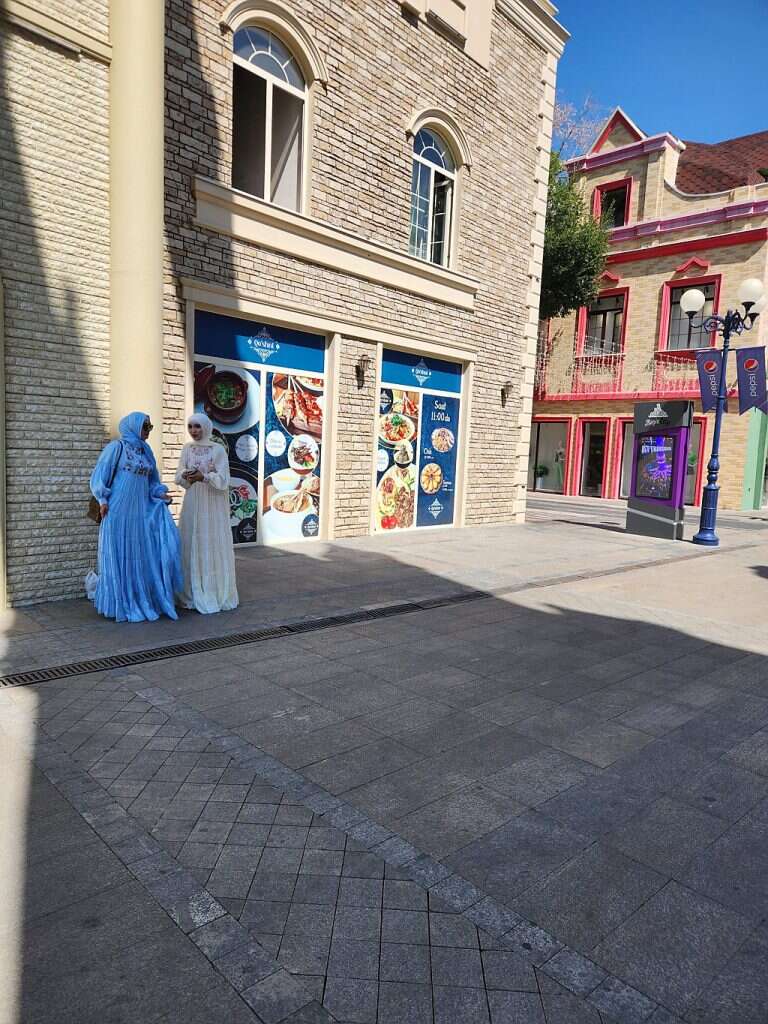
Not just secular – open
Uzbekistan proudly upholds secularism as a core principle of its constitution. While Islam is not the official religion, there has been a recent resurgence in conservative values, leading some individuals to dress more modestly. But in the public sphere, there are constant reminders that this is a secular country.
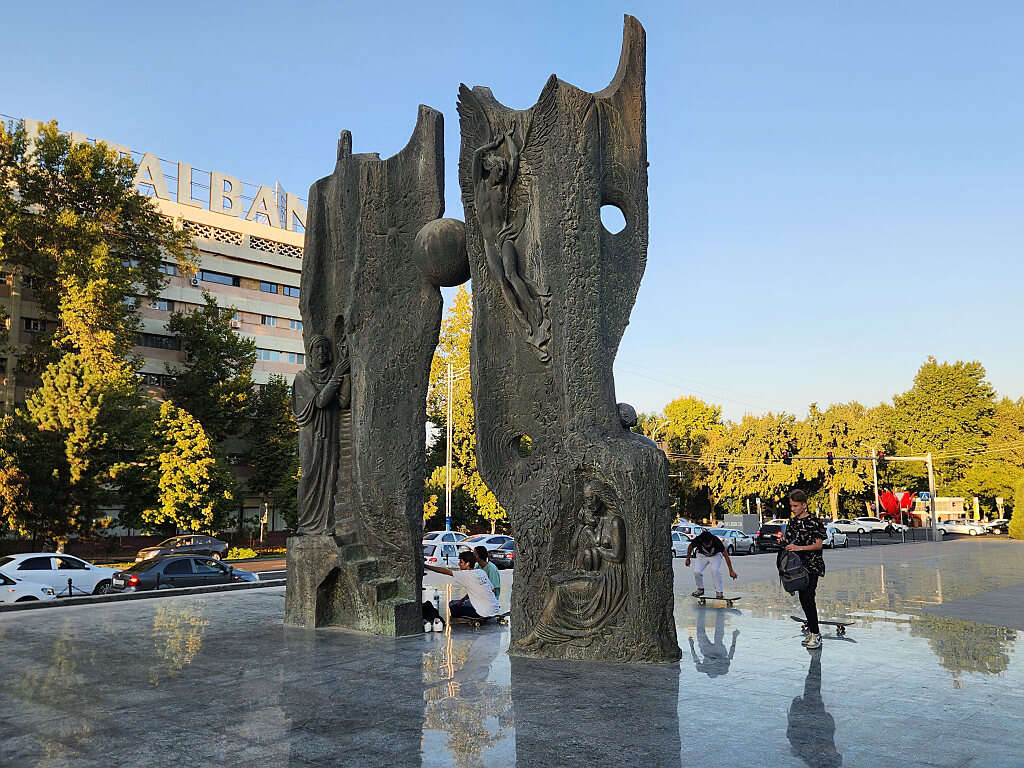
For example, a Tashkent monument to Uzbek cosmonauts and scientists includes a bare-chested woman holding a baby. She is depicted alongside the famous scientist Abu Rayhan Muhammad ibn Ahmad al-Biruni, who created the first globe in central Asia, as well as many other astronomical tools. The stairs of the monument represent space travel. This monument encapsulates the essence of how Uzbekistan combines modernity, egalitarianism, science, and a future-looking approach that respects Islamic traditions.
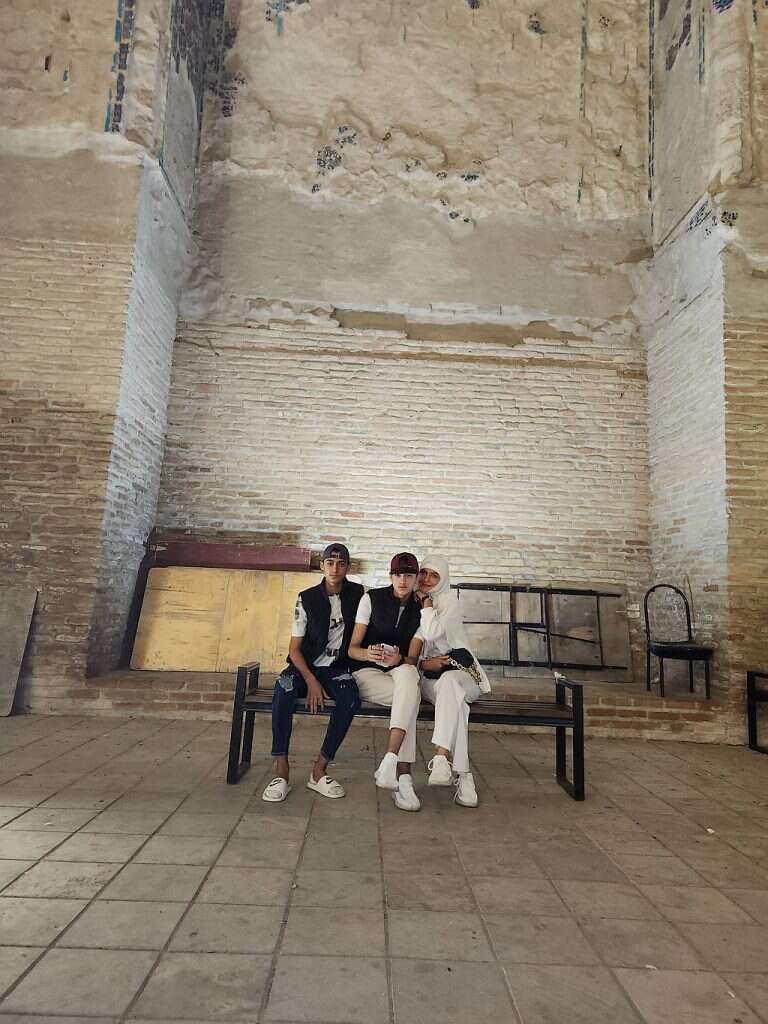
Would-be destroyers and the miracle of Bukhara
Uzbekistan is a land steeped in history, as seen in its numerous landmarks. The Great Minaret of Bukhara (Kalon Minaret), standing tall since the 12th century, tells tales of resilience against invaders like the Mongols and Russians. The white spots indicate holes that had to be patched up because of bombs. It is said that when Genghis Khan arrived he looked up at the 48-meter-tall structure and his cap fell off. He then realized he could not topple it. The architect is buried nearby. Legend has it that he used wool and milk from camel to fortify it and built it at an angle that would ensure that if it were to be toppled it would "topple only on my grave," literally: he is buried just next to it.

Amir Timur: The man who made Uzbekistan possible
Amir Timur, the founder of the ancient empire that eventually led to Uzbek statehood, made sure he would be buried with his head at the feet of his spiritual teacher Mir Sayyid Baraka. In Uzbek tradition respect for teachers plays an important role. He is buried in Samarkand in a special mausoleum where he, his teacher, and other notable figures of his time were buried. Despite what you think, his grave is not the largest, but it is marked in black. As noted, his head "meets" his teacher, whose grave is the largest in the plot (although the largest grave in the complex is that of a holy person).
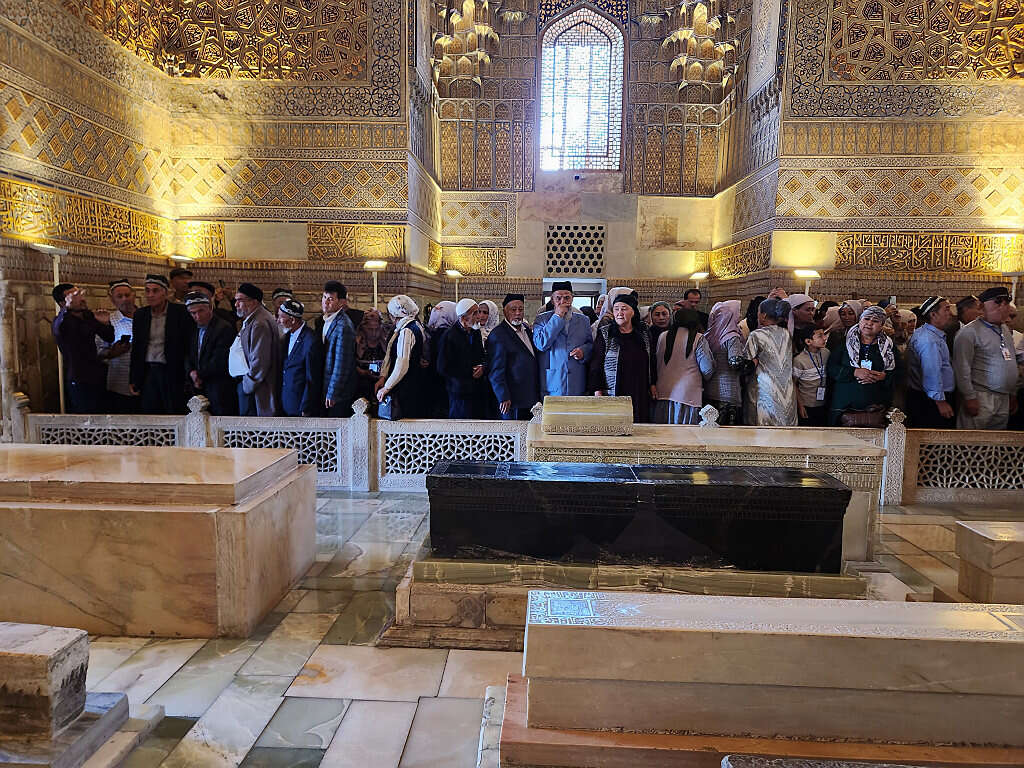
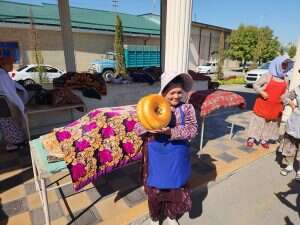
Amir Timur's statue in the heart of Tashkent commemorates the founder of the Uzbek nation during ancient times, emphasizing the country's rich historical heritage. Amir Timur said that "power is in justice". This statue has lain at the heart of the capital Tashkent, since 1994 (after the Soviets were gone), honoring his work as the founder of the Timurid Empire, which set the nation on a path to its modern-day iteration as a proud Muslim state that looks outward to the world.
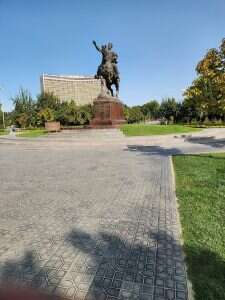
The bread and butter of a nation
Travelers in Uzbekistan often find themselves immersed in unique experiences, but visiting the Grand Bazaar in Tashkent (the Chorsu Bazaar) will awe even the experienced haggler. A bustling market filled with meat, grains, spices, clothing shops, and much more. But if there is one thing that you cannot resist and eat, wherever you go, is the Uzbek bread, often made with just yeast, water, and flour, and can last for years. Every city, it seems, has its own style, depending on how flat and chewy it is. The most famous bread is the one in Samarkand. For a reason still not known, it has a special quality to it. Gala Osiyo, a town just outside the city, has the special bread everyone is talking about. You can easily identify it with its thick, donut-shaped features, with soft texture inside. Legend has it that the Mongol ruler in ancient times could not understand why the bread made in Samarkand could not be replicated in Bukhara. Ultimately, it was concluded that there must be something in the air.
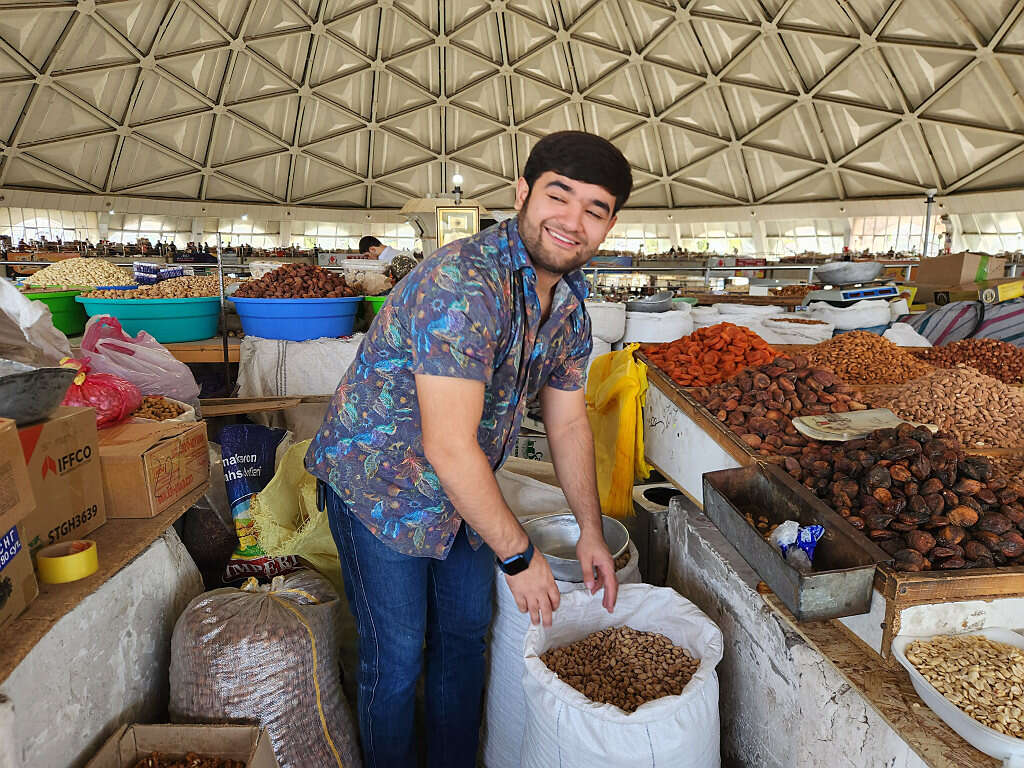
Exploring the Border Town of Gilon
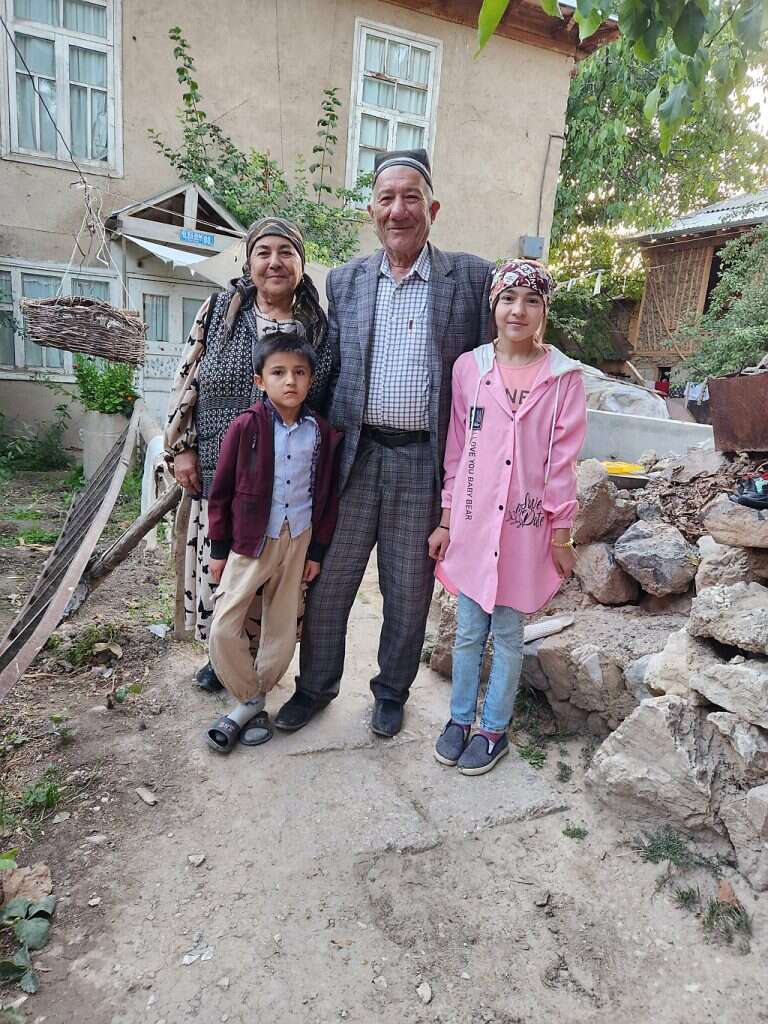
For those seeking natural beauty and cultural immersion, a visit to the border town of Gilon, nestled against Tajikistan, offers breathtaking views and warm hospitality. The town's apple orchards and rugged terrain make it a compelling destination.
A country that prides itself in tolerance
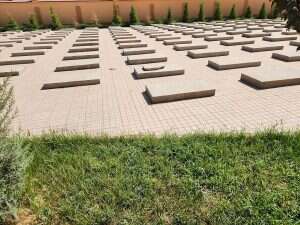
One might think that a Muslim country with such great history and pride would try to show its "anti-Israel" credentials, as nearby Iran or Pakistan have for decades. But the opposite is true. Among the dozens of ethno-religious minorities in the country, there is also a small Jewish community that is thriving, with a synagogue and cemetery in practically every big city (it's hard to discern what the exact number of Jews is, in part because of a long history of Jews maintaining a low profile during Soviet times, including through the hiding of scripture and liturgy inside other content).
It is estimated that at least several thousand Jews are in the capital Tashkent and its environs with a similar amount scattered in other localities, including in Bukhara, which has an old Jewish quarter with a synagogue that does not fully operate on Shabbat, but it is nevertheless a must-see place.
The Jewish cemetery in Shakhrisabz, which dates back to 1200 is unique in that it also commemorates the roughly 20 Jews who died when they protested against a Soviet plan to destroy the place in favor of a new road. A lot of the gravestones are left without epitaphs due to the dead being unidentified, with only 80 having the names of the dead on them. The town prides itself in maintaining the upkeep of the on-site synagogue and the cemetery, having been renovated with the help of the Jewish community abroad. The local caretaker, while not Jewish, feels a deep connection to the community. The renovations of the graves was completed in 2022, at which point it was reopened.
A new effort by the government to promote tourism in Samarkand. led to the creation of a mega-complex called Silk Road Samarkand with a convention center and an outdoor concert venue along with hotels. Although the site is still being upgraded, it is already very much functioning. One of the attractions there is the hotel resort area, which includes a unique shopping area for traditional Uzbek garbs, food and souvenirs, called The Eternal City. "This site which occupies 17 hectares accurately recreates the spirit of the ancient city backed up by the history and traditions of Uzbek lands and Uzbek people for the guests of Silk Road Samarkand. The narrow streets here house multiple shops of artists, artisans, and craftsmen," the website says.
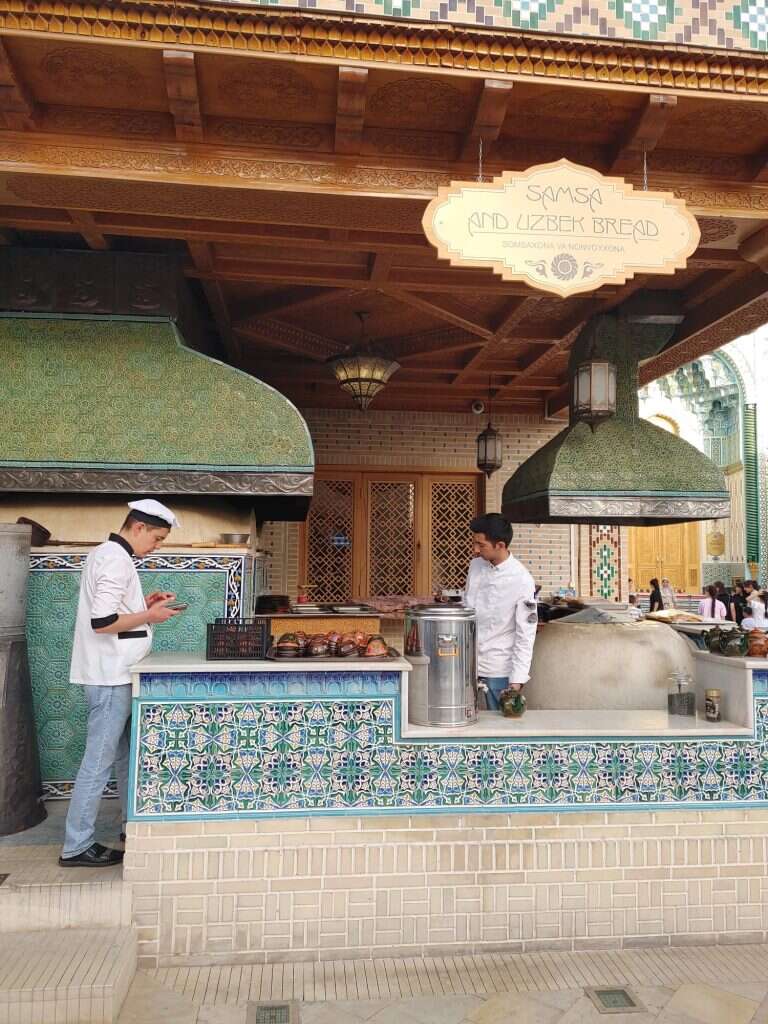
Uzbekistan is at the crossroads of the ancient civilizations in Europe, Asia and the Middle East. Such a geographical location opens up unique opportunities for the country's guests to explore new traveling destinations in the Central Asia region and its neighboring countries.
Uzbekistan's centuries-old cities, such as Samarkand, Bukhara, Khiva, and Shakhrisabz, are full of richness and diversity of history and cultures. At the same time, one can find a plethora of opportunities to feel the spirit of modern Uzbekistan's development.
Tourism builds an important bridge between Uzbekistan and Israel, enabling Israeli tourists to easily experience Uzbekistan firsthand. In 2022, Uzbekistan welcomed around 12,000 Israeli citizens.
Air connections between the two countries are robust, with Uzbek carriers like Uzbekistan Airways and Qanot Sharq operating regular flights. More Uzbek and Israeli companies are expected to participate in developing air links and tourism.
Flights from Israel reach beyond Tashkent to Samarkand, a UNESCO World Heritage Site and historic Silk Road gem. The government hopes to make Samarkand the "tourist gateway to the Nnew Uzbekistan positioning the city as a hub for tourism and business.
The writer was part of a media delegation and was a guest of the Uzbekistani Embassy in Israel, which organized and covered the entire trip in September 2023. You can reach Samarkand International Airport by the Uzbek airline Qanot Sharq with a direct flight from Tel Aviv to Samarkand International Airport, which has undergone extensive renovations and is set to serve as a major international hub for everyone traveling to the east. There is also a Tashkent-Tel Aviv direct route operated by Uzbekistan Airways. Israeli citizens do not need a visa to Uzbekistan for visits of up to 30 days.
Subscribe to Israel Hayom's daily newsletter and never miss our top stories!

